Your cart is currently empty!
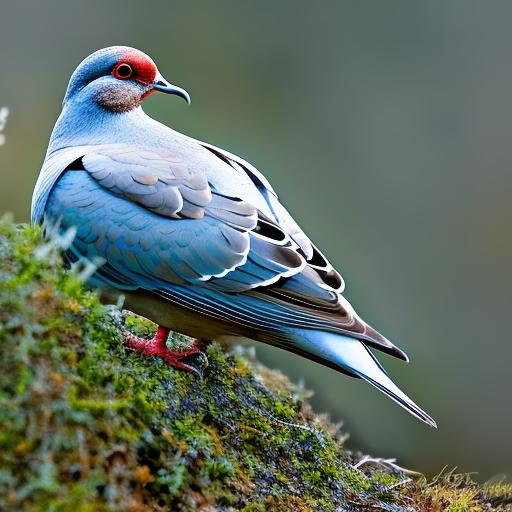
The Secret Calendar: Pinpointing the Best Time to Hunt Doves!

Table of Contents
Introduction
Hey fellow hunters! We’ve all been there – trekking out early in the morning or settling down in the evening, filled with anticipation, hoping that today is THE day for that perfect hunt. Yet, sometimes, despite all our prep, those elusive doves seem to have a mind of their own. That got me thinking; there’s more to hunting doves than meets the eye. And, trust me, after years of chasing small game and watching these beautiful creatures, I’ve stumbled upon what I like to call the ‘secret calendar. It’s not some mystical almanac or a cryptic diary from a bygone era, but a culmination of observations, insights, and yes, a few cherished secrets I’ve picked up over the years. And guess what? I’m spilling the beans right here for my fellow hunters, be it beginners itching for their first catch or seasoned pros looking to refine their game.
Now, before we dive deep into the world of dove behavior, regional quirks, gear specifics, and more, let’s get one thing straight – there’s always a bit of unpredictability when it comes to nature. However, with a bit of guidance and a sprinkle of tried-and-tested wisdom, you can up your chances significantly. This isn’t just another guide; it’s an insider’s look, a genuine attempt to bridge the gap between those frustrating misses and triumphant catches. Whether you’re nestled in the plains or perched atop a hilly terrain, there’s something here for everyone. Let’s journey together and unravel the mystery behind pinpointing the best time to hunt doves. Shall we?
Understanding Dove Behavior
The Dance of Migration:
One of the first things any dove hunter should recognize is the migratory pattern of these birds. Like clockwork, doves have specific times of the year when they take to the skies in larger groups, making their way to warmer or cooler habitats depending on the season. Typically, doves head south when the chill sets in and make their way back when warmer days are on the horizon. This movement is critical for us hunters. Being aware of these patterns gives you a leg up, ensuring you’re in the right place at the right time, ready to spot those flocks.
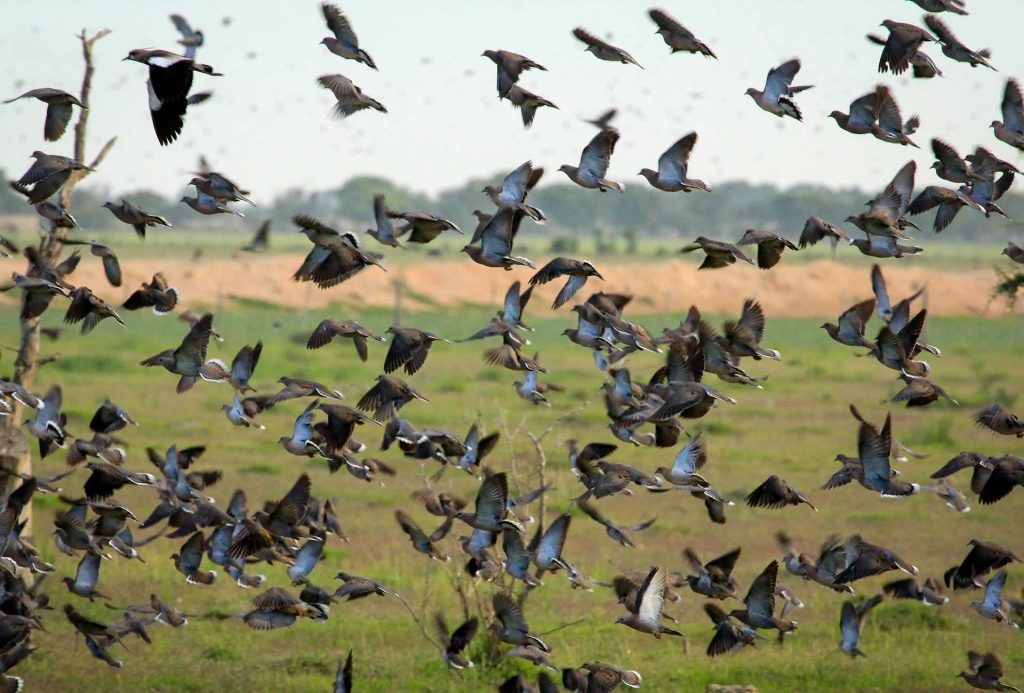
Daily Rituals – Morning vs Evening:
Doves, much like us after a good night’s sleep or at the close of a long day, have their routines. Morning and evening present prime opportunities, but each has its distinct characteristics. In the early hours, you’ll find doves setting out from their roosts, searching for water and food. This makes spots near water bodies or freshly harvested fields a potential gold mine. Come evening, they are on the move again, heading back to their roosts. Keep an eye out for trees or power lines; these are often favored by doves for a quick rest before they settle down for the night. Understanding these daily habits helps you position yourself strategically.
Weather Watchers:
These little birds are quite sensitive to weather changes. While a mild, clear day can see a flurry of activity, doves tend to lay low during gusty or stormy conditions. They’re not fans of strong winds or rain, often seeking shelter and waiting out the unpleasantness. But here’s a tip: after a bout of bad weather, once things clear up, it’s often a bonanza. Doves come out in droves, eager to feed and drink. This post-storm window, though short, can be a fruitful time for hunters who are ready to seize the opportunity.
The Social Habits of Doves:
Ever notice how you rarely see a lone dove? They’re social creatures, often flying, feeding, and roosting in groups. While this offers more targets, it also means more pairs of watchful eyes. Your approach needs to be stealthy. Understanding their social nature also plays into another handy tip: doves often follow a leader, particularly when coming in to land. If you’ve identified a frequent landing spot, hold your fire for the first few birds. Let them lead the others in, increasing your chances of a better shot.
Decoding Their Calls:
Now, here’s a nuance that often goes unnoticed. Doves have a variety of calls – from coos of courtship to the more frantic sounds of alarm. Tuning into these can give you a lot of intel. A sudden burst of alarm calls? Might want to check if you’ve been spotted or if there’s another predator around. The gentle, rhythmic cooing? It’s often a sign of contentment, an indicator that doves are at ease, going about their usual routines.
In the grand theater of nature, every creature, including doves, plays its part with specific behaviors and habits. Decoding these, getting into the mindset of your quarry, is both a thrill and an invaluable skill. Remember, hunting is as much about observation and understanding as it is about the actual chase. So, the next time you’re out in the field, keep these behavioral tidbits in mind. It might just make all the difference between an empty bag and a fruitful hunt. Happy hunting, and may the doves be ever in your favor!
The Role of Geography in Dove Hunting
Terrains and Their Tales:
Geography isn’t just about marking spots on a map; it’s about understanding the lay of the land. Different terrains present varied challenges and opportunities for dove hunters. For instance, flat plains and fields, often rich in grains, attract doves in abundance. They offer a buffet these birds can’t resist. On the other hand, hillier terrains, with their undulating landscapes, can be a bit trickier. Here, understanding where doves might find pockets of food or water becomes crucial. It’s about piecing together the landscape puzzle to predict where these birds might flock.
Water Bodies – Nature’s Dove Magnets:
Regardless of the region you’re hunting in, one geographical feature stands out as a dove magnet: water. Doves, like all creatures, need water to survive. Ponds, lakes, or even small streams become hotspots, especially in drier regions. If you’re near a water source in an otherwise arid landscape, you’ve hit the jackpot. But don’t just set up shop anywhere. Observe the patterns. There’ll always be specific spots around these water bodies where doves prefer to alight, drink, and rest.
Regional Rhythms:
Different geographical regions have their own unique dove-hunting calendars. While general migratory patterns apply, regional quirks can influence dove movement. For instance, in the southern states, the hunting season might kick off a bit earlier due to the onset of cooler weather sooner than in northern areas. Coastal areas, influenced by marine weather patterns, might see different dove behaviors than more inland regions. It’s all about syncing your hunting calendar with the rhythm of the region.
Vegetation and its Virtues:
Ah, the joy of sitting near a field brimming with sunflowers or grains, waiting for doves to descend! The type of vegetation in an area plays a significant role in its attractiveness to doves. Crops, both mature and freshly harvested, are prime spots. The former offers food, while the latter provides an easy pick from the ground. Regions with a mix of agricultural fields surrounded by woods or shrubs can be especially lucrative. The fields feed the doves, and the woods provide them shelter. For us hunters, it’s a two-for-one deal!
The Importance of Elevation:
It might sound odd, but elevation can play a role in dove hunting. At higher altitudes, the air is thinner, and temperatures can be cooler. Doves, being agile and fast fliers, might alter their flying patterns in these conditions. They might fly lower than usual, or choose valleys and depressions to move through. If you’re hunting in a mountainous region, the valleys and lower regions might prove more fruitful than the peaks.
Navigating the geography of dove hunting is akin to reading a story. Each region, with its terrains, water bodies, vegetation, and elevations, narrates a unique tale of dove behavior. For us hunters, every day out in the field adds a new chapter to our personal hunting saga. The more we immerse ourselves in understanding these geographical tales, the richer our hunting experiences become. So, next time you set out with your gear, take a moment to appreciate the land, understand its stories, and let the geography guide your hunt. Remember, in the world of dove hunting, every hill, valley, and field has a secret waiting to be discovered!
Essential Gear for Timed Hunts
Shooting Essentials: Choosing the Right Shotgun and Ammo:
When it comes to dove hunting, not just any shotgun will do. Given that doves are small and agile, you’ll want a shotgun that’s both lightweight and accurate. Over-under and semi-automatic shotguns tend to be favorites among dove hunters. As for the ammo, 7½ or 8 size shot works wonders, offering a nice spread without too much force – we want to honor the game, after all!
Camouflage and Clothing – Blend, Don’t Stand:
Doves have a keen sense of sight, and anything out of place can send them fluttering away. This is where camouflage comes into play. Depending on your region and the season, choose camo patterns that mimic your surroundings. Whether you’re in a grainy field, wooded area, or near a water source, blending in is key. Additionally, invest in a good hat to shield your face from the sun and keep it hidden – remember, sudden movements or any reflective gear can alert doves.
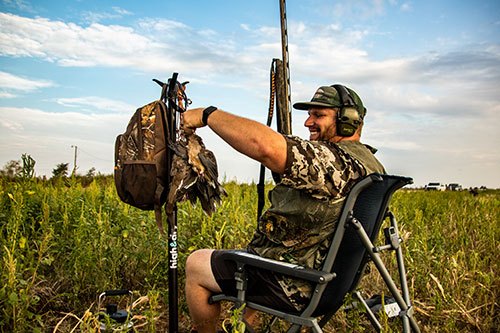
The Magic of Decoys:
You could be in the best spot at the prime time, but sometimes, doves need a little nudge to come closer. Enter dove decoys. These replicas, when placed strategically, can trick doves into thinking it’s a safe zone. Some even come with motion features, mimicking real doves landing or feeding. It’s like setting the stage, inviting the real birds to join the party.
Comfort in the Field – Chairs and Coolers:
Here’s the thing about timing your hunts – you might be out for a while, waiting for that perfect moment. Comfort becomes paramount. Portable hunting chairs or stools can be a lifesaver. Choose lightweight, easily foldable options. And let’s not forget sustenance! A cooler with some snacks and drinks can make your wait much more pleasant. A hydrated and comfortable hunter is a patient and successful hunter.
Eyes in the Sky: Binoculars and Sunglasses:
Scanning the horizon, spotting a flock in the distance, or simply observing dove behavior – a good pair of binoculars is indispensable. Opt for ones with clear optics and a comfortable grip. While binoculars help in spotting doves, sunglasses protect your eyes from the glaring sun. Go for polarized shades; they cut out reflections and give you a clearer view.
Hunting Bags and Vest:
Once you’ve had a successful hunt, you need somewhere to store those doves. A good hunting bag or vest with ample pockets and storage space is essential. Plus, it’s handy for keeping extra ammo, your water bottle, or any other small tools you might need on the go.
The Unsung Hero: A Reliable Hunting Watch:
We’re talking about timed hunts here, and what’s a timed hunt without keeping track of time? A good hunting watch, preferably with weather predictions and maybe even sunrise/sunset times, can be invaluable. It helps you strategize, knowing how much daylight you’ve got left or if a weather shift is on the horizon.
The essence of a well-timed dove hunt isn’t just knowing when to be where, but also being prepared with the right gear. It’s a blend of patience, strategy, and a touch of tech and comfort. So, the next time you’re gearing up for that much-anticipated dove hunt, run through this list, pack smart, and step out with confidence.
Practical Tips and Tricks for Timed Hunts
The Early Bird (or Hunter) Gets the Dove:
You’ve heard the phrase, and in dove hunting, it couldn’t be more true. Doves are most active during the cooler hours of the morning and evening. Setting up before sunrise or a few hours before sunset increases your chances of a successful hunt. Plus, the world at dawn or dusk? It’s a sight to behold!
Monitor the Weather, But Trust Your Instincts:
While technology provides us with detailed weather forecasts, sometimes Mother Nature has plans of her own. Overcast days can be just as fruitful as clear ones if you know where to look. But remember, strong winds or heavy rains can dampen your hunt. It’s always a balance between the forecast and your gut feeling.
Stay Still and Silent:
Doves have keen senses. A sudden movement or noise can send a whole flock scattering. Once you’re in position, stay as still and silent as possible. If you must move, do so slowly and deliberately. Think of it as a game of stealth, and you’re the master of disguise.
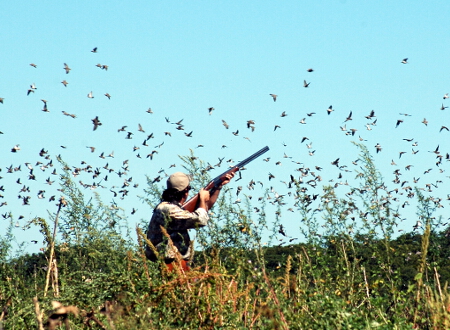
The Art of Spreading Out:
If you’re hunting in a group, spread out. Cover more ground and prevent doves from having a centralized area to avoid. Doves, noticing the dispersion, might feel there’s a safe passage somewhere, and that’s when you can take your best shot.
Hydrate and Take Breaks:
In the heat of the hunt (sometimes literally), it’s easy to forget about personal well-being. Drink water, snack when needed, and don’t push yourself too hard. A clear, hydrated mind is more alert and ready to make that perfect shot.
Always Be Prepared to Change Spots:
Loyalty is commendable, but if a spot isn’t yielding results, don’t be afraid to relocate. Doves can be unpredictable. Sometimes, moving just a few hundred yards can drastically change your luck.
Keep an Eye on Flight Patterns:
Doves often fly along certain patterns or routes, especially when heading to water or food sources. Observing these can give you insights into their behavior, helping you anticipate their next move. It’s a bit like chess, predicting your opponent’s next play.
Clean Up After the Hunt:
Lastly, always leave nature as you found it. Whether it’s spent shells or your snack wrappers, ensure you pack out everything you brought in. It’s a nod of respect to the great outdoors and the game you pursue.
Remember, dove hunting isn’t just about the act itself but the entire experience. Every hunt teaches something new. Over time, these practical tips and tricks, combined with your growing experience, will transform every timed hunt into a cherished memory. Stay patient, stay observant, and most importantly, enjoy the journey!
Related Questions:
Is there a specific month that is the absolute best for dove hunting?
Ah, the golden question! While the best month can vary based on region, many seasoned hunters swear by early September. It’s the sweet spot when migratory patterns of doves align with the beginning of hunting seasons in many places. That said, local conditions, food availability, and other factors can influence dove activity, so it’s always wise to keep a finger on the local pulse or chat up fellow hunters in your area for insights.
How do weather conditions like rain or wind affect dove hunting?
Weather plays a fascinating role in dove hunting. Rain can be a double-edged sword. A light drizzle might keep doves grounded, making them easier targets. However, a heavy downpour? That’s likely to keep them (and probably you) sheltered. As for wind, it’s tricky. Strong winds can alter dove flight patterns, making them more unpredictable. On breezy days, observe the direction – doves often fly into the wind when taking off from food sources or water. Adjust your position and strategy accordingly, and embrace the challenge!
Are there any ethical concerns to consider when hunting doves at certain times?
Absolutely. Ethical hunting revolves around respect for the game and nature. One major consideration is the nesting season. It’s essential to avoid hunting during times when doves are nesting or rearing their young. This ensures that populations remain healthy and sustainable. Moreover, always hunt within legal seasons and limits. Over-hunting or hunting outside of designated times can disrupt migratory patterns and harm local dove populations. Being an ethical hunter means striking a balance between sport and stewardship.
Summary
And there you have it – the ins and outs of the ‘secret calendar’. After our deep dive into the world of doves, I hope you feel more equipped and a tad bit wiser. Remember, hunting is as much an art as it is a sport. It’s about understanding, adapting, and most importantly, respecting the rhythms of nature. I’ve been at this for years, and I still find myself learning something new every season. That’s the beauty of it! While the tips and insights shared here will undoubtedly give you a leg up, it’s your observations and experiences in the field that will truly refine your craft. I’d love to hear about your hunting tales, the hits and misses, the surprising behaviors you’ve noticed, or any little secret you might have stumbled upon. The world of hunting is vast and ever-evolving, and every bit of shared knowledge makes us all better hunters. So, here’s to clearer skies, the perfect timing, and the joy of the hunt. Until next time, stay curious, stay observant, and happy hunting!

Herb has been a longtime lover of the outdoors. Whether it be hunting, camping, fishing or just getting outside to reset. Proud father and animal lover. Bourbon anyone?

by
Tags:
Comments
5 responses to “The Secret Calendar: Pinpointing the Best Time to Hunt Doves!”
-
[…] hunter wanting to upgrade, this guide is tailored just for you. So, let’s dive into the world of dove hunting attire and make sure the next time you head out, it’s with confidence, comfort, and […]
-
[…] Hey there, fellow hunters! If you’ve ever been intrigued by the graceful flight of doves and wondered how to hunt them, you’re in the right place. Dove hunting is not just about the thrill of the chase; it’s a tradition, a bonding experience, and for many, a way of life. As someone who’s spent a good chunk of their life specializing in hunting small game, I’ve had my fair share of experiences – both the highs of a successful hunt and the lows of missed opportunities. But that’s the beauty of it, isn’t it? Every hunt is a learning experience. This guide on “how to hunt doves” is a culmination of years of experience, tips, tricks, and a deep respect for the game. Whether you’re a seasoned hunter or just starting out, there’s always something new to learn. So, strap in and get ready for a deep dive into the world of dove hunting. […]
-
[…] those designed for hunters, can be invaluable. They can help you mark potential hotspots, track dove movement patterns over time, and even share insights with fellow hunters. Some of my most successful hunts have been a result […]
-
[…] your chances of success. Check out this informative article on the Old Oak Syndicate website: Best Time to Hunt Doves. It provides valuable insights and tips for dove hunting […]
-
[…] providing valuable insights and tips for successful dove hunting trips. Check out the article here to enhance your hunting skills and make the most of your time in the great […]

Categories
- Big Game Hunting (301)
- Deer (202)
- Reviews (3)
- Shooting (16)
- Slingshot (1)
- Small Game Hunting (42)
- Upland Hunting (126)
- Waterfowl Hunting (3)




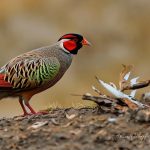
Leave a Reply